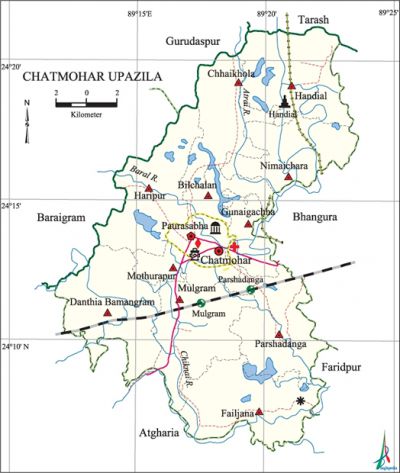Chatmohar Upazila
Chatmohar Upazila (pabna district) area 310.10 sq km, located in between 24°06' and 24°21' north latitudes and in between 89°12' and 89°24' east longitudes. It is bounded by gurudaspur and tarash upazilas on the north, atgharia upazila on the south, faridpur (pabna) and bhangura upazilas on the east, baraigram and Gurudaspur upazilas on the west.
Population Total 291121; male 144820, female 146301; Muslim 278311, Hindu 10417, Christian 2043, Buddhist 1 and others 349.
Water bodies Main rivers: baral, Chiknai, atrai; Failam Beel, chalan beel, Kural Beel, Diksal Beel are notable.
Administration Chatmohar Thana was formed in 1909 and it was turned into an upazila in 1982.
| Upazila | ||||||||
| Municipality | Union | Mouza | Village | Population | Density (per sq km) | Literacy rate (%) | ||
| Urban | Rural | Urban | Rural | |||||
| 1 | 11 | 161 | 236 | 14443 | 276678 | 939 | 76.3 | 43.9 |
| Municipality | ||||||||
|
Area |
Ward |
Mahalla |
Population |
Density |
Literacy rate | |||
| 1 | 11 | 161 | 236 | 14443 | 276678 | |||
| Union | ||||
| Name of union and GO code | Area (acre) | Population | Literacy rate (%) | |
| Male | Female | |||
| Gunaigachha 43 | 3119 | 6017 | 6208 | 52.4 |
| Chhaikhola 11 | 6420 | 14576 | 14633 | 42.5 |
| Danthia Bamangram 25 | 9902 | 14996 | 14817 | 44.3 |
| Parshadanga 94 | 7956 | 11079 | 11383 | 46.3 |
| Nimaichara 86 | 6561 | 13771 | 13666 | 32.7 |
| Failjana 34 | 8731 | 15954 | 16051 | 38.1 |
| Bilchalan 13 | 3619 | 8521 | 8661 | 52.0 |
| Mothurapur 70 | 3954 | 7936 | 8433 | 53.0 |
| Mulgram 77 | 7868 | 16073 | 16463 | 45.2 |
| Haripur 60 | 8555 | 14331 | 14818 | 47.1 |
| Handial 51 | 9143 | 14328 | 13963 | 41.5 |
Source Bangladesh Population Census 2011, Bangladesh Bureau of Statistics.

Archaeological heritage and relics Chatmohar Shahi Mosque (989 AH, 1681 AD), Khonkarni Mosque at Pathanpara, Jagannath Mandir at Handial, Snana Mandir, Kuthi or Bangala of the Seth (1779), singledomed Mosque (Handial Paik Para), tomb of Hazrat Ashraf Jhedani (R).
War of Liberation Freedom fighters had an encounter with the Pak army near a railway bridge on the bank of the Chiknai river in which 7 freedom fighters were killed. A memorial monument has been built at Gunaigacha Math.
For details: see চাটমোহর উপজেলা, বাংলাদেশ মুক্তিযুদ্ধ জ্ঞানকোষ (Encyclopedia of Bangladesh War of Liberation), বাংলাদেশ এশিয়াটিক সোসাইটি, ঢাকা ২০২০, খণ্ড ৬।
Religious institutions Mosque 317, temple 90, tomb 3, church 4. Noted religious institutions: Chatmohar Shahi Mosque, Pathanpara Khonkarni Mosque, Mazar (tomb) of Shah Chetnor (R) at Sahapur, Mazar of Hazrat Ashraf Jhedani (R.), Mazar of Bura Pir at Handial, Jagannath Mandir at Handial, Kali Mandir at Chatmohar and Snana Mandir.
Literacy rate and educational institutions Average literacy 45.6%; male 47.1%, female 44.1%. Noted educational institutions: Chatmohar Degree College (1970), Professor Bayen Uddin Degree College (1995), Chatmohar Mahila College (1996), Maydan Dighia Krishi College (1994), Chatmohar Raja Chandra Nath High School, Babu Sambhunath High School (1861), Haripur Durgadas High School (1925), Haripur School and College (1935), Parshadanga High School (1960), Kuyabashi Dakhil Madrasa (1974).
Newspapers and periodicals Weekly: Chatmohar Barta; extinct: Sabuj Patra, Weekly Gayana Bikashini (1873), Palli Darpan (1874).
Cultural organisations Library 5, club 55, community centre 1, cinema hall 4.
Main sources of income Agriculture 71%, non-agricultural labourer 3.22%, industry 2.24%, commerce 9.78%, transport and communication 2.64%, service 4.49%, construction 0.72%, religious service 0.17%, rent and remittance 0.15% and others 5.59%.
Ownership of agricultural land Landowner 57.43%, landless 42.57%; agricultural landowner: urban 48.85% and rural 58.29%.
Main crops Paddy, jute, wheat, potato, chilli, onion, garlic, khesari, musur, mustard, chickpea, coriander, betel nut.
Extinct or nearly extinct crops Kaun, arahar, barley, ground-nut, china, local variety of aman paddy.
Main fruits Mango, jackfruit, litchi, banana, blackberry, papaya, coconut.
Fisheries, dairies and poultries Fishery 17, dairy 115, poultry 150, hatchery 2, nursery 16.
Communication facilities Pucca road 98 km, semi-pucca road 29 km, mud road 514 km, waterway 9 km; railway 16 km. Railway Station 3.
Extinct or nearly extinct traditional transport Palanquin, soari, horse carriage and bullock cart.
Cottage industries Weaving, lime industry, catechu industry, oil-mill, bamboo and cane work.
Hats, bazars and fairs Hats and bazars are 27, fairs 2,' noted of which are Chatmohar Rail Bazar, Mirzapur, Mothurapur, Chatmohar Natun Bazar; Sahapur Mela and Chadak Puja Mela at Bonthar are notable.
Main exports Paddy, jute, khesari, bamboo and cane work.
Access to electricity All the wards and unions of the upazila are under rural electrification net-work. However 43.8% of the dwelling households have access to electricity.
Sources of drinking water Tube-well 93.2%, tap 1.5% and others 5.3%. The presence of arsenic at an intolerable level has been detected in the water of 36 shallow tube-wells out of 3219 shallow tube-wells of the upazila.
Sanitation 79.9% of dwelling households of the upazila use sanitary latrines and 17.5% of dwelling households use non-sanitary latrines; 2.6% of households do not have latrine facilities.
Health centres Upazila health complex 1, family welfare centre 1, satellite clinic 8, eye hospital 1, clinic 3, cattle breeding centre' 1.
NGO activities Operationally important NGOs are brac, asa. [Md Habibur Rahman]
References Bangladesh Population Census 2001 and 2011, Bangladesh Bureau of Statistics; Cultural survey report of Chatmohar Upazila 2007.
